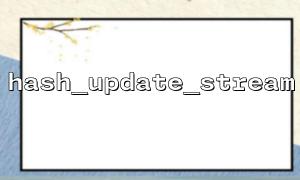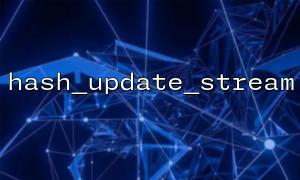In PHP programming, the hash_update_stream function is a commonly used tool to update hash values. It gradually updates the hash values by reading a given stream. hash_update_stream is very useful when we process large files or streaming data. However, when using it, you may sometimes encounter situations where stream data cannot be read, which often causes the program to be unable to continue processing the stream and may affect the results of the hash calculation.
In this case, we need to take some measures to ensure the stability and robustness of the program. Below, we will explain in detail how to deal with these situations.
First, let’s take a look at the basic usage of hash_update_stream . The function of this function is to update the hash value through a stream (such as a file handle or other resource).
<?php
$hash = hash_init('sha256'); // Initialize aSHA-256Hash
$stream = fopen('file.txt', 'r'); // Open the file stream
if ($stream) {
hash_update_stream($hash, $stream); // Update hash value
fclose($stream); // Close the file stream
} else {
echo "无法Open the file stream。\n";
}
?>
In the above code, hash_update_stream is used to read data from the file stream and update the hash value. If the file stream cannot be opened, the program will output an error message.
If you encounter situations where you cannot read stream data when using hash_update_stream , you will usually have the following reasons:
The file does not exist or is inaccessible: It may be that the file path is wrong, or the file permissions are incorrect.
Network flow unstable: If the flow comes from a remote server (such as an HTTP request), network connection interruption or server unavailability may cause data to not be read.
Stream resource is closed: If the stream resource is accidentally closed while reading stream data, it may cause the readability to continue.
To solve these problems, we can adopt the following strategies:
Make sure the file or streaming resources are available before doing anything. The state of the stream can be verified by is_resource or other checking functions.
<?php
$hash = hash_init('sha256');
$stream = fopen('https://m66.net/file.txt', 'r'); // Try to open a remote file
if ($stream && is_resource($stream)) {
hash_update_stream($hash, $stream);
fclose($stream);
} else {
echo "Unable to open stream or invalid stream。\n";
}
?>
If the stream resource is invalid, you can take corresponding error handling measures, such as retry or return an error.
In some cases, it may be necessary to read the contents of the stream into memory at one time and then have a hash update. You can use stream_get_contents to read the content of the stream, which can handle the failure of stream reading more flexibly.
<?php
$hash = hash_init('sha256');
$stream = fopen('https://m66.net/file.txt', 'r');
if ($stream) {
$data = stream_get_contents($stream);
if ($data === false) {
echo "Read stream failed。\n";
} else {
hash_update($hash, $data);
}
fclose($stream);
} else {
echo "Unable to open stream。\n";
}
?>
In this way, you can perform error handling and exit in time when streaming data cannot be read, avoiding program crashes.
For situations where network instability may exist (such as when reading data from an HTTP request stream), you can increase the robustness of your program by setting timeout and retry mechanisms.
<?php
$hash = hash_init('sha256');
$url = 'https://m66.net/file.txt';
$attempts = 3;
$success = false;
for ($i = 0; $i < $attempts; $i++) {
$stream = @fopen($url, 'r');
if ($stream) {
hash_update_stream($hash, $stream);
fclose($stream);
$success = true;
break;
} else {
echo "Try the first{$i}Time failed,Trying again...\n";
sleep(1); // pause1Try again in seconds
}
}
if (!$success) {
echo "Unable to get streaming data,Operation failed。\n";
}
?>
This method can effectively avoid operation failure due to short network problems by setting the number of retry times and intervals.
When using hash_update_stream , if you encounter a situation where the stream data cannot be read, we can handle it through the following methods:
Ensure that the file or streaming resources are valid.
Use stream_get_contents instead of hash_update_stream to read the content of the stream at once.
Add timeout and retry mechanisms, especially when handling network flows.
Through these methods, we can ensure that the program can handle it gracefully when encountering streaming data reading problems and continue to run normally.














